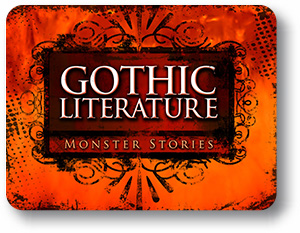
From vampires to ghosts, these frightening stories have influenced fiction writers since the 18th century. This course will focus on the major themes found in Gothic literature and demonstrate how the core writing drivers produce, for the reader, a thrilling psychological environment. Terror versus horror, the influence of the supernatural, and descriptions of the difference between good and evil are just a few of the themes presented. By the time students have completed this course, they will have gained an understanding of and an appreciation for the complex nature of dark fiction.
Note: This course is not designed for ELL (English Language Learners) students. ELL students may enroll in this course ONLY if they have adequate mentor support at their home school and are able to fulfill all course requirements.
Unit 1: GOTHICA: When Gruesome is Delicious
In this unit you will learn about the Gothic genre of literature. We will begin with a lesson about Gothic literature’s place in history and society. Next we will discuss its major themes and the effect it is designed to have upon its audience. We will then look at the definitions of certain terms that are important to this genre. Lastly, we will examine various examples of works that fit this category, including both poetry and novels.
What will you learn in this unit?
Unit 2: FRANKENSTEIN: A Monster is Born
In this unit you will begin to study the novel Frankenstein, by Mary Shelley. We will start with some basic information about the author’s life and times. We will look at important vocabulary terms, the key characters of this novel, and their relationships with one another. You will then read the first half of the novel itself and explore the themes that have emerged in those chapters.
What will you learn in this unit?
Unit 3: FRANKENSTEIN: With Great Power Comes Great Responsibility
It is now time to read the second half of the novel Frankenstein. We will examine some modern examples of science and culture that relate to Frankenstein’s themes. In this unit you will again look at important vocabulary terms from this novel and related readings. A writing assignment will give you an opportunity to analyze and express your opinion on some of the information you have read in the lessons surrounding this novel.
What will you learn in this unit?
Unit 4: JEKYLL & HYDE: To Thine Own self Be True
In this unit you will read the short novel The Strange Case of Dr. Jekyll and Mr. Hyde, by Robert Louis Stevenson. As with the previous novel, we will begin with basic information about the author’s life and times. Next we will look at important vocabulary terms, the key characters of this novel, and their relationships with one another. You will then read the novel itself and begin to think about its themes.
What will you learn in this unit?
Unit 5: GOTHIC POETRY: Love From Beyond the Grave
So far you have been working hard on the two Gothic novels we have just finished studying. Let us now give our minds a bit of a break and examine some shorter pieces of material from…beyond the grave! We will begin with an eighteenth-century German ballad about a maiden and her absent lover. The lovers’ theme will continue with a nineteenth-century English poem about a rather macabre way of expressing one’s love. The last poem is from the early twentieth century, also about a pair of lovers who become victims of tragic wartime circumstances. We will then look at the definitions of poetry terms that are exemplified in these works. Lastly, we will search for modern examples of stories, songs, etc., that remind us of events described in these poems’.
What will you learn in this unit?
Unit 6: DRACULA: The Blood is the Life
It is now time to begin your study of the novel Dracula, by Bram Stoker. You will first learn about Stoker’s life and literary connections. Then you will examine a list of important vocabulary terms and key characters. Next you will learn about some of the medical theories that were held by Victorian readers of this novel. You will then view a map and learn about the geography involved in the story. Lastly, you will read the first half of Dracula and respond to chapter study questions before finishing the rest of the novel in the next unit.
What will you learn in this unit?
Unit 7: DRACULA: The Hunter Becomes the Hunted
It is now time to read the second half of the novel Dracula. You will begin by previewing some of the vocabulary that appears in chapters 14 through 27. Next you will look deeper at two branches of social science that are prevalent in the novel. You will then read about the nighttime activities of the Dead in a poem by Goethe, whom you studied earlier in this course. In lesson four you will finish reading Dracula itself. This unit concludes with a creative assignment that combines your knowledge of vampires with your knowledge of physiognomy (which will be covered in lesson two).
What will you learn in this unit?
Unit 8: EDGAR ALLAN POE: The Monsters In Us
This unit begins with an overview of the life of Edgar Allan Poe. Following that is a lesson containing important vocabulary words from two of his stories that you will read. You will next read two pieces of Poe’s horror fiction that employ dark Gothic features: “The Black Cat” and “Berenice.” The last section of this unit will allow you to choose one of three creative options to prove your familiarity with its content and story vocabulary.
What will you learn in this unit?
